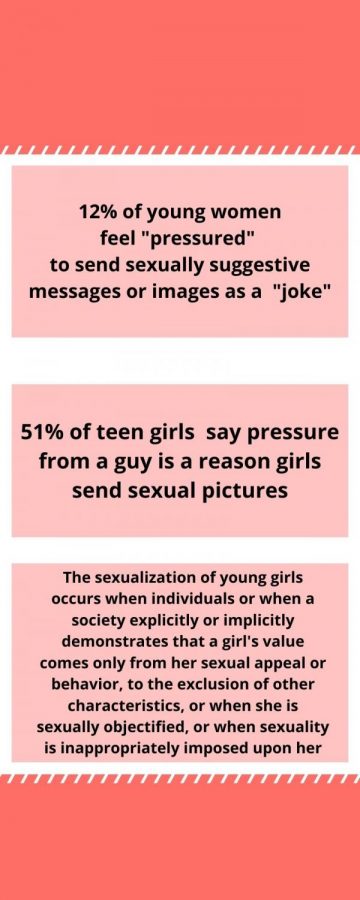Media normalizes sexualization of adolescents girls
Sources: GaurdChild and Verywell Mind
February 13, 2021
In just one year, grade school children could take in as many as 80,000 ‘sexy girl’ portrayals while watching kid targeted TV programs, according to DeseretNews. TV shows and movies often sexualize girls to gain popularity and money. For instance, the movie “Cuties” made 11 year old’s perform provocative dances and wear revealing clothing, taking away focus from the main storyline about the young girls’ journey to self-realization.
When a young girl is sexualized or objectified it can cause many long-term mental health concerns. According to American Psychology Association, the sexualization of young girls and women has cognitive and emotional consequences. Objectifying someone can undermine their confidence and comfort with their own body, leading to emotional and self-image problems such as shame and anxiety. It can even negatively affect a girl’s ability to develop a healthy sexual self-image.
“When girls are exposed to numerous unrealistic media portrayals of girls their age, this can easily lead to internal conflict, confusion and/or self-loathing,” Chantilly social worker Elyse Brunais said. “Additionally, this ongoing sexualization can create long-standing health and mental health issues for females.”
On social media trends like ‘sexy’ selfies are made popular through celebrities such as the Kardashians, who were known for posting these kinds of selfies even as young teenagers. Even though the intention was to maybe empower women, it has influenced many minors to post sexually charged photos on social media.
“Concern about the sexualization of adolescent girls is not new, but for sure, social media has opened new and uncharted ways for teenagers to be exposed and or to expose themselves in a sexualized manner,” Chantilly social worker Dana Condemi said.
According to Verywell Mind, when girls are viewed as objects on social media, it can be psychologically damaging, when they start to prioritize physical attractiveness or sexual worthiness above personal well-being. Hence, when a young girl suffers from poor mental health, she becomes vulnerable to manipulation, false promises, violent acts and mistreatment.
“Developmentally, there is a period of time where teens see themselves as being either in the ‘in group’ or the ‘out group’ and social media has contributed and elevated those views,” Chantilly social worker Amy Deemer said. “For example, garnering ‘likes’ on social media posts that are sexual in nature can then elevate a teen’s social status.”
Corporations and the media need to understand the negative effects of sexualizing girls at such a young age. So far, a hashtag called #MeToo has generated conversations about getting sexualized, sexual assault and sexual harassment that contribute toward more awareness among girls of their right to bodily autonomy.
“I think more can be done to educate and bring about awareness of social media literacy to the parents of adolescent kids,” Condemi said. “I would encourage parents to not only have open and honest conversations with their teenagers about their online presence, but to also encourage respectfulness about gender and sexual identity and collaborate with their teens on how to balance a social media presence that does not sexualize them or their peers.”



